NRL 2020: How Peter V’landys saved rugby league from COVID-19 crisis and financial ruin
PART ONE: In a revealing two-part interview with Phil Rothfield, ARLC boss Peter V’landys details how the National Rugby League went from the brink of financial ruin to the envy of corporate Australia and international sport.
NRL
Don't miss out on the headlines from NRL. Followed categories will be added to My News.
Six NRL clubs were in danger of going broke and being lost to the game at the height of the COVID-19 pandemic, such was the catastrophic position of the sport’s finances.
For the first time independent commission chairman Peter V’landys has revealed the extreme threat to the survival of battling Sydney franchises and the perilous position of the entire game.
In an extraordinary two-part interview, V’landys and former Queensland premier and former ARL Commission chairman Peter Beattie take us inside the $2 billion TV broadcast talks that have saved the game and explain the brutal parting of ways with NRL chief executive Todd Greenberg.
The V’landys crisis-management business model to achieve a May 28 rugby league resumption is now the envy of corporate Australia and international sport.
THE FINANCES
On Saturday March 21, at a time when there were predictions 150,000 Australians could die, V’landys spent the day poring over NRL financial spreadsheets.
He is an accountant by profession with a speciality in analysing figures and cost structures. He had every expense line, every detail on revenue.
“When I used the word catastrophic I was thinking this was bad enough to send five or six clubs broke,” he explains, “And how would we have got them back?
Kayo is your ticket to the 2020 NRL Telstra Premiership, returning Thursday 28th May. Watch every game Live & On-Demand with no-ad breaks during play. New to Kayo? Get your 14-day free trial & start streaming instantly >
“We had no idea we’d be back in three months or a year. It all was unknown.
“I was so concerned for the clubs. They were getting no money through the gate, memberships were gone, no poker machine revenue, no broadcast money and had sponsors dropping out.
“They had all this expensive cost structure with football departments and employees across their businesses. Seriously, how were they going to survive?”
The horrible possibility of starting up again with only 10 clubs was considered.
“We could have had a situation where the game was unrecognisable by the time we came out of it,” V’Landys said, “What if we’d had to go to a 10-team comp? I was horrified to even think about it.”
LISTEN! In a special edition of The Daily Telegraph NRL Podcast, Sports Editor-at-large Phil Rothfield tells Adam Mobbs about his behind-the-scenes story on how Peter V’landys and the NRL overcame a litany of obstacles to become the first major sporting code in Australia to return to the field.
Coronavirus brought forward a train crash that was always going to happen in rugby league.
If there was an intensive care unit for sport, the NRL was first patient in, floored like so many others by the COVID-19 pandemic. There would be 16 beds — one for each club.
“This is not a beat-up,” says Peter Beattie, “Seriously, we were absolutely stuffed. Rugby league as we knew it could have fallen over and folded.”
The intricate detail around the NRL reopening on Thursday night is sport’s most remarkable comeback story, driven so relentlessly by a man who didn’t jump daily hurdles, but crashed through them.
“V’landys is a warrior,” said Roosters boss Nick Politis, “He’ll set a goal and then crash through brick walls to achieve it … and he knows how to handle people.”
Beattie points out: “When was the last time you could say rugby league was miles ahead of the AFL? They’ve been following us for once. It’s all Peter.
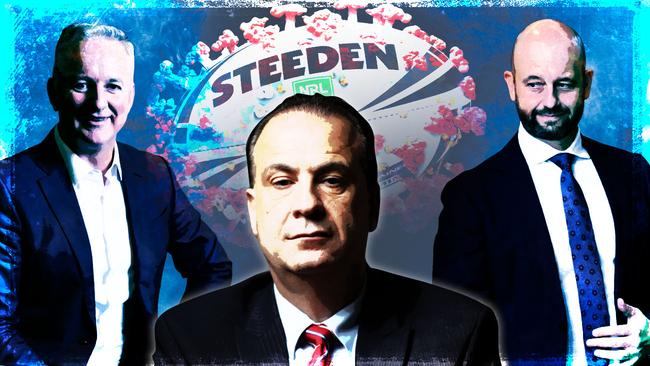
“I’m not a dramatic person and I don’t overstate it … we had no revenue, no assets, nothing.
“Channel 9 had told the share market they were going to save $130 million. Who was going to save the clubs and pay the players? Seriously we were stuffed, like right on the edge of the cliff.”
The outlook is now brighter around the game.
Cost cuts were immediately implemented at NRL headquarters and around the clubs with 90 per cent of staff sent on leave or getting the Job Keeper allowance.
At the NRL no-one could spend more than $1000 without approval from CFO Tony Crawford.
Executives took 25 per cent pay cuts. Still, only game-day operations staff and commercial revenue employees are back working full-time.
THE CLUBS
V’landys is hell bent on saving all 16 clubs. He’s on their side big-time because he loves the rivalries, the tribalism and suburban ground football.
He knows however they need to work smarter.
“I don’t blame the clubs because they’re all there to win the comp,” he said.
“The successful clubs might have revenue to support spending spend $6 million on the footy department.
“To compete against them, smaller clubs have coaches who think ‘the opposition is spending $6 million so we need to’. They can’t afford it.
“We had a false economy. They’ll do all they can but sometimes their decisions are not the brightest.”
The TV deal
This was by far V’landys’ toughest assignment. He often used the word ‘brutal’ to describe negotiations.
Initially Channel 9 wanted out. This is a fact. Doing it tough like all media organisations, they recognised an opportunity to save $130 million if the competition was shut down for the year.
Insiders have revealed the network had been losing almost $50 million a year from rugby league in a soft sales market with shrinking ratings. This year was shaping as even worse.
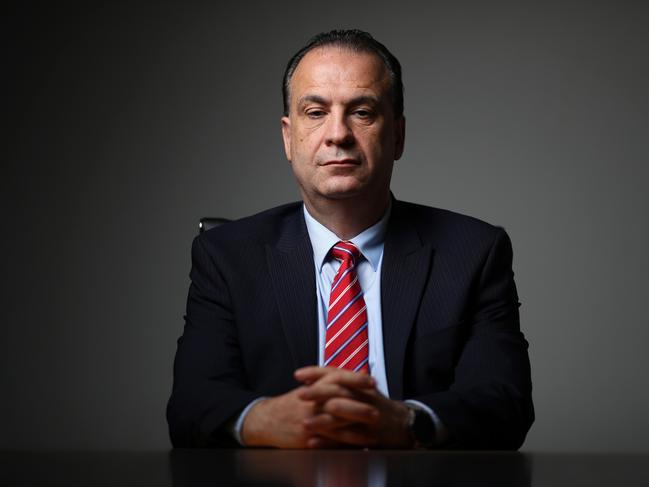
The difference in these TV talks compared to previous negotiations is that there was no bidding war.
Despite reports to the contrary, rivals network Channel 7 or Channel 10 were at no stage serious players. Put it this way, there was never going to be another Super League war over the rights.
There had been talk of Netflix, Amazon and all the giant global players wanting part of the action — but there was never any genuine interest.
Nine boss Hugh Marks knew this and even threatened to walk away from the game.
“It’s not a given that NRL has to be part of our future,” he said, “We’re a business that actually is now less reliant on live sport. It (NRL) has to just pay its way like all of our content does.”
“V’landys is a warrior. He’ll set a goal and then crash through brickwalls to achieve it,”
Roosters boss Nick Politis
An NRL source revealed Marks even once said: “I’m out … go to Channel 7.”
Foxtel played hardball, too. Yet, realistically, while the pay-TV network could always survive without rugby union and soccer, they were stuffed without rugby league.
Eventually Nine realised the public relations backlash was becoming too severe.
If they were to pull out it could potentially bring the game down from the clubs to grassroots.
There were reports Marks was told by his board to make the deal happen. No more threats of abandoning the negotiations. The fans/viewers had to come before shareholders.
Rugby league had always been in the network’s DNA. They could not afford to alienate their bread and butter audience. Not while the Today show was trying to make up ground on Sunrise and their nightly news bulletin was neck and neck with Channel 7.
V’landys worked hard to rebuild the relationship with Nine. Some initially thought he was too soft when he even apologised to Nine for the state of the NRL.
“My focus was getting a deal for the game and ignoring the noise in the background,” he said.
“I didn’t want to go into war with them because you get better results if you have a relationship. They had no trust in the NRL whatsoever, especially Channel 9, who thought they’d been dudded many times. To a certain degree I could understand their frustrations over the (NRL’s establishment of a) digital department.
“And you don’t do that to your two major partners. My first objective was to win their trust back and to deliver what I told them I could.”
THE TALKS
The parties got on surprisingly well despite all the talk of aggro.
“I actually found Hugh Marks a trustworthy person,” V’landys said. “He doesn’t gloss over things.
“I’d prefer someone coming in boots ‘n’ all rather than sugar-coating around the issues. You’ve got to be genuine in these sort of negotiations. That way you can address their concerns.
“You’ve also got to respect the person on the other side of the table.
“He was doing his best for his organisation. How can you bag that? Same with (Foxtel CEO) Patrick Delany.
“Were they going to lie down and say ‘take whatever you like’? Of course not. They fought tooth and nail. It did get brutal but that’s business.”
Business deals that are often done over a long lunch at a flash restaurant have a different feel.
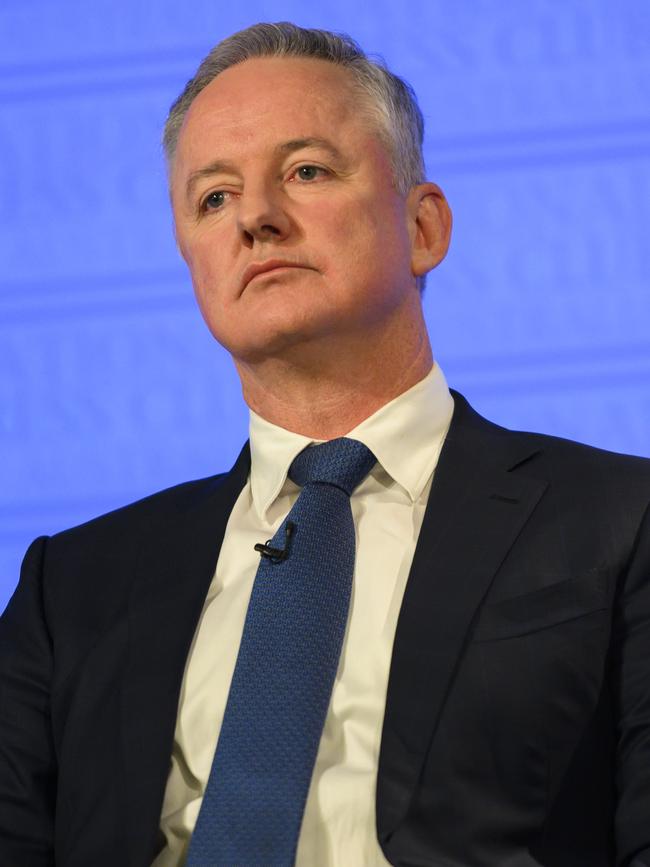
COVID-19 meant Zoom, Facetime, phone hook-ups or face-to-face at Racing NSW or the NRL with plates of sandwiches.
V’landys was like a front-rower in the old softening-up exchanges, trying to break down his opponent. Then acting CEO Andrew Abdo joined the meetings to work through the finer detail.
“We had to show we were genuine,” V’landys said. “And Andrew was fantastic. We’d re-established relationships.”
Could he have realistically lost Channel 9? And how did he deal with suggestions from Nine’s ‘‘always independent’’ newspapers he was in News Corp’s pocket?
Nine’s first offer was less than half their original agreement. “Many times I was worried they’d pull out,” V’landys said. “Hugh could genuinely see no benefit in Channel 9 having rugby league.
“And the News Corp Fox Sports business — ask anyone who has been in the meetings I’ve had with them over the years. I’ve had a stack of blues with them because they know I’m always trying to do the best for my business.
“At the end of the day all parties acted in good faith and we got an outcome.”
GREENBERG’S EXIT
“It could have got ugly,” said one insider, “but Peter gave him the dignity to resign.”
V’landys refuses to discuss Greenberg’s departure because of a confidentiality agreement.
Informed sources, however, reveal there was a complete breakdown of trust between the pair.
They had one blazing row when, sidelined from TV negotiations, Greenberg secretly approached Channel 7 boss James Warburton without V’landys’ knowledge.
V’landys, at this stage, had assured Nine they were talking to no other network. It could have been seen as an act of sabotage. “It would have pissed off Channel 9 big time,” said a source. “V’landys was trying to build trust.”
Greenberg’s departure on April 20 allowed V’landys to get the television negotiations into full swing.
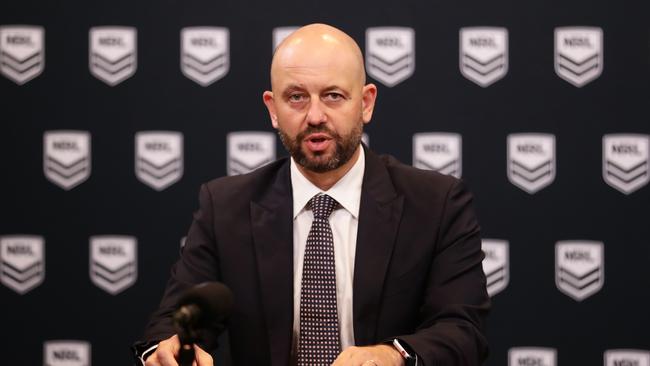
Publicly he had supported Greenberg because he had to, despite a tsunami of resentment that was coming from all directions.
The clubs, the broadcasters and the state bodies all wanted him gone. He had lost the confidence and trust of all major stakeholders.
It was his mixture of arrogance and overconfidence, which V’landys even admitted in an interview in early March.
“There is a bit of an issue,” he said, “and I can’t hide it. Some of the clubs certainly aren’t supportive. I don’t think he’s arrogant, but some other people believe he is.”
Greenberg was often accused of lacking transparency. Clubs’ requests for financial/commercial information were often just ignored.
BELOW: TIMELINE OF NRL’S COVID-19 HELL
“We constantly asked questions but the NRL wouldn’t answer them satisfactorily,” said South Sydney Rabbitohs boss Blake Solly, “clubs were frustrated.”
Even the independent commission, who he reported to, was often kept in the dark.
Before V’landys became chairman, Greenberg ran his own race. He kept several of the eight commissioners in the loop but generally ran the game by himself.
As an example, when the 2020 draw was revealed last November, commissioners hadn’t even seen it. They read about it online on the day it was released like everyone else.
News Corp, publishers of The Daily Telegraph, were over Greenberg as much as Channel 9 but had better table manners and expressed their dissatisfaction privately.
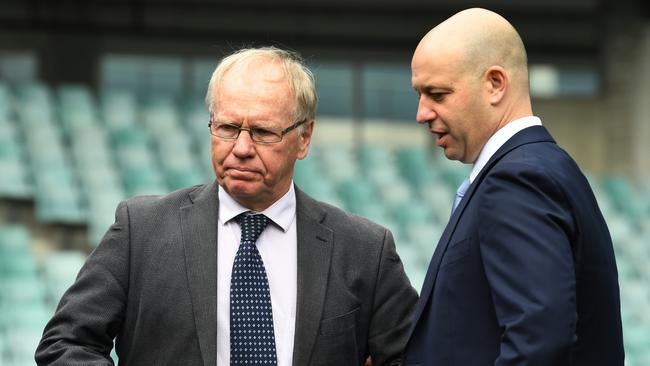
When TV executives made it clear Greenberg was no longer welcome at broadcast rights meetings, V’landys knew it was time to act.
On the morning of April 20, with the support of the commission, he rang Andrew Abdo to offer him the role.
The one thing that had been holding him back was Greenberg’s relationship with Premier Gladys Berejiklian. They were tight and the NRL needed the Premier and all key politicians onside if the May 28 resumption date was to be a realistic target.
The Premier had even been spotted the week before at the Oatley Hotel in Sydney’s south at the 50th birthday party of Greenberg’s wife Lisa.
V’landys had cabinet powerbrokers onside but the Pemier was a Greenberg fan.
This is where long-time Roosters chairman Nick Politis would have stepped in.
He has a direct line to the Premier and the charm to smooth relationships. In the end the Premier rang V’landys to assure him the government would continue to support the game on the day after Greenberg left.
MONEYBALL
The game needed cash to survive but the big four banks are reluctant to lend money to down-and-out footy codes.
In 2017, then NRL commission chairman John Grant tried to borrow $30 million for emergency cash flow but got rejected.
If the loan goes bad, the banks foreclose on assets but the NRL had none.
The potential public relations backlash for NAB, Westpac, CBA or Westpac from having to close down a bad debt with a code like league is not worth their risk.
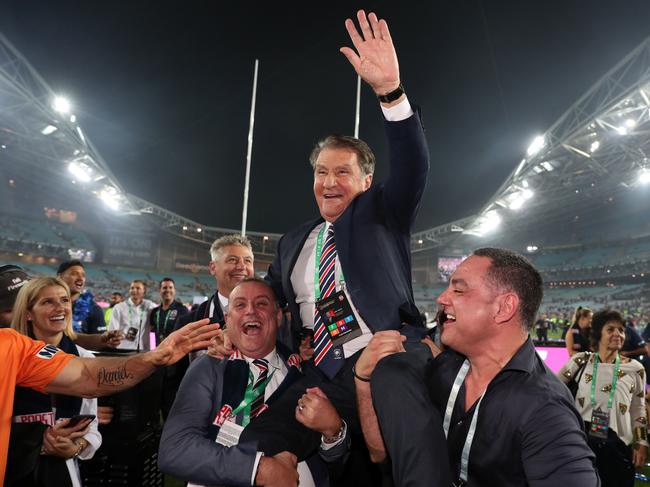
Melbourne Storm chairman Bart Campbell came to the rescue, securing a $250 million line of credit from UK financiers, brokered by London firm Oakwell Sports Advisory. Still, one club boss blew up and asked: “What’s Bart’s cut?”
For the AFL it had been much easier. They used their ownership of Marvel Stadium as security for a $600 million credit facility with NAB and ANZ.
At least the $250 million gave the NRL a lifeline and, more importantly, some leverage in that they wouldn’t have to completely roll over in tough broadcast talks with Nine and Foxtel. Now they weren’t as desperate.
TO HELL AND BACK
March 2, 2020: NRL launches controversial multimillion-dollar “Simply the Best” ad campaign.
March 10: Bulldogs Corey Harawira-Naera and Jayden Okunbor are stood down for having sex with two schoolgirls after bringing them back to the team hotel during the club’s visit to Port Macquarie for a trial game. It is understood both females were above the age of consent and the sex was consensual.
March 12: NRL tells players to minimise non-essential contact from Round 1.
March 13: NRL announces Round 2 would be played within closed stadiums, after federal and state governments ban mass gatherings to slow the spread of COVID-19.
March 18: All community rugby league is postponed until May to help slow the COVID-19 spread.
Former News Corp chairman John Hartigan tells media that the NRL and broadcasters should renegotiate a new long-term deal to save the game.
March 21: New Zealand Warriors coach Stephen Kearney says his squad will remain in Australia for the entire NRL season.
March 23: The NRL and ARLC suspend the 2020 season indefinitely.
March 24: Warriors squad returns to New Zealand as the country is locked down.
March 25: The NRL and Rugby League Players Association (RLPA) start conversations about player pay cuts.
March 27: The NRL cancels Magic Round in Brisbane.
Nine informs NRL that it would not make its quarterly payment to NRL on April 1. The broadcaster also indicates plans to both renegotiate its current rights deal and extend its boadcast partnership with NRL beyond 2020. Nine and Foxtel had signed a $1.8 billion deal to televise the NRL for five years from 2018.
The NRL and state bodies cancel a string of representative competitions including the Harvey Norman Women’s National Championship, Canterbury Cup, Jersey Flegg Cup, SG Ball Cup, Harold Matthews Cup and Tarsha Gale Cup.
March 29: Reports surface that the Sydney Roosters and Warriors may withdraw their NRLW sides to cut costs during the pandemic.
March 30: The NRL announces a recovery plan — $40 million in monthly payments for clubs between April and October to cover operational costs. The NRL also announces it will reduce its operating costs by 53 per cent, including a 95 per cent reduction in staff and 25 per cent pay cut in executive salaries during the shutdown.
Nine tells shareholders it would save $130 million this year if the 2020 NRL season was axed.
April 1: Bulldogs players Jayden Okunbor and Corey Harawira-Naera are deregistered by the NRL for their schoolgirl sex romp.
April 2: Players cop a 71 per cent pay cut. The NRL and the RLPA agree that $24.6 million would be distributed to players to soften the financial blow of COVID-19 on the game.
Players agree to forego five out of 12 months’ salary if 2020 season is unable to resume.
April 3: The Daily Telegraph reveals that the NRL has launched Project Apollo, an Innovation Committee headed by Wayne Pearce, to restart the competition. Project Apollo was initially working towards a restart date of June 1.
April 9: Project Apollo recommends that 2020 season resumes on May 28. ARLC endorses the proposal.
April 9: Channel 9 accuses NRL of mismanagement, squandering millions of dollars from broadcast rights deals, and threatens to walk away from the game.
April 10: Players renegotiate to take a 72 per cent pay cut.
April 20: Todd Greenberg steps down as CEO of the NRL. Andrew Abdo is appointed acting CEO.
April 27: Latrell Mitchell, Josh Addo-Carr and Tyronne Roberts-Davis break COVID-19 rules during a weekend camping trip to Mitchell’s farm in Taree, and are subsequently fined $1000 by NSW Police.
April 28: Photos emerge of Penrith star Nathan Cleary drinking with girls on his couch, seemingly breaking COVID-19 rules. Cleary apologises, saying he “stuffed up” by letting his sister’s friends wait for an Uber inside his house on Anzac Day. The NRL fines Cleary $4000.
The NRL issues Mitchell, Addo-Carr, Cleary and Roberts-Davis with breach notices for bringing the game into disrepute. The players are fined and cop one-match suspensions.
The NRL announces the 2020 season will recommence as a 20-round competition on May
28, with the grand final to be played on October 25.
April 29: TikTok videos surface of Cleary dancing with girls inside his home, indicating that the Panthers playmaker did not tell the NRL Integrity Unit the full extent of the Anzac Day encounter.
May 1: NSW Deputy Premier John Barilaro tells NRL to suspend any player who breaches COVID-19 guidelines between now and May 28, warning: “if it happens in the season, the competition will get shut down.”
Queensland Premier Annastacia Palaszczuk allows NRL players to play and train in the state.
May 2: The NRL gains approval for the Warriors to fly to, isolate, train and play within Australia.
The NRL scraps its controversial “Simply The Best” ad campaign.
May 4: NRL squads officially return to work.
May 5: Gold Coast back-rower Bryce Cartwright opposes the NRL’s request for all players to get flu vaccinations before the competition restarts.
May 6: Clubs recommence training sessions, working in groups of 10. Players accept 20 per cent pay cut.
May 7: Canberra Raiders Josh Papalii, Joe Tapine and Sia Soliola refuse to sign the NRL’s vaccination waivers, rejecting compulsory flu shots.
May 8: Titans anti-vaxxers Bryce Cartwright and Brian Kelly are stood down.
May 11: NRL slaps Cleary with a $30,000 fine and a two-match suspension for being “untruthful” with the NRL Integrity Unit about hosting visitors in his home during isolation. Cleary’s housemate and teammate Tyrone May also cops a $15,000 fine and one-match suspension failing to co-operate with the investigation.
May 12: NSW Police fine Nathan Cleary $1000 for allegedly breaking social distancing rules.
Reports surface that Souths centre James Roberts has checked himself into rehab.
May 13: The ARLC announces that only one on-field referee would be used for the rest of the season. The body also announced that ruck infringements would now warrant six more tackles, rather than a penalty.
May 14: The referees union files a complaint with the Fair Work Commission over the NRL’s new one-ref system and threatens to strike. Cartwright granted medical exemption from Queensland Health officials to play this season without flu vaccination.
May 17: South Sydney’s Cody Walker tells police he was being blackmailed over a video of him karate kicking a man in the chest in a fight. The video emerges, showing Walker kicking a man in the chest. He is subsequently cleared by police.
League great Arthur Summons passes away at the age of 84.
May 19: NRL referees union boss Silvio Del Vecchio backs down from threats of strike action. The NRL and referees union meet with Fair Work for three hours, but peace talks fail.
ARLC approves six venues for resumption of season — Bankwest Stadium, Campbelltown Stadium, Central Coast Stadium, Suncorp Stadium, QCB Stadium and AAMI Park.
NRL steps closer to finalising a television deal, after two months of negotiations. ARLC approves a deal sent out to both Nine and Fox Sports, with approval still required from both boards.
May 20, 2020
The Daily Telegraph reveals Greg Inglis will make a shock league comeback by signing a one-year contract with Super League club Warrington.

